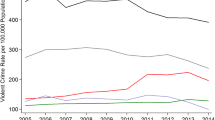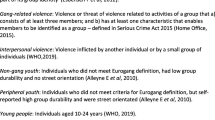Abstract
Background
People bring the social contexts of their lives into the medical encounter. As a social determinant of health, police brutality influences physical and mental health. However, negative experiences with institutions such as law enforcement might decrease trust in other institutions, including medical institutions. Mistrust might limit engagement with the healthcare system and affect population health. This study investigates the relationship between police brutality and medical mistrust and assesses whether it varies by race.
Basic Procedures
Data were obtained from a 2018 cross-sectional survey of adults living in urban areas in the USA (N = 4389). Medical mistrust was regressed on police brutality (experiences and appraisal of negative encounters with the police), controlling for socio-demographics, health status, and healthcare access. Means of mistrust were predicted by racial group after including interactions between police brutality and race.
Main Findings
Respondents who had negative encounters with the police, even if they perceived these encounters to be necessary, had higher levels of medical mistrust compared to those with no negative police encounters. Police brutality increased mistrust for all racial groups.
Principal Conclusions
Conditions outside the medical system such as experiencing police brutality impact relationships with the medical system. Given that clinicians are in a unique position of having access to firsthand information about the struggles and injustices that shape their patients’ health, advocating for systemic change on behalf of their patients might build trust.

Similar content being viewed by others
References
Alang S, McAlpine D, McCreedy E, Hardeman R. Police brutality and black health: setting the agenda for public health scholars. Am J Public Health. 2017;107:662–5.
Bandes S. Patterns of injustice: police brutality in the courts. BuffLRev. 1999;47:1275–341.
Chaney C, Robertson RV. Racism and police brutality in America. J Afr Am Stud. 2013;17:480–505.
Cooper HLF, Fullilove M. Editorial: excessive police violence as a public health issue. J Urban Health. 2016;93:1–7.
Sewell AA, Jefferson KA, Lee H. Living under surveillance: gender, psychological distress, and stop-question-and-frisk policing in New York City. Soc Sci Med. 2016;159:1–13.
DeVylder JE, Frey JJ, Cogburn CD, Wilcox HC, Sharpe TL, Oh HY, et al. Elevated prevalence of suicide attempts among victims of police violence in the USA. J Urban Health. 2017;94:629–36.
Bor J, Venkataramani AS, Williams DR, Tsai AC. Police killings and their spillover effects on the mental health of black Americans: a population-based, quasi-experimental study. Lancet. 2018;392:302–10.
Sewell AA, Jefferson KA. Collateral damage: the health effects of invasive police encounters in New York City. J Urban Health. 2016;93:42–67.
Sewell AA. The illness associations of police violence: differential relationships by ethnoracial composition. In: Sociological Forum. 2017. pp 975–97.
Mechanic D. The functions and limitations of trust in the provision of medical care. J Health Polit Policy Law. 1998;23:661–86.
Williamson LD, Bigman CA. A systematic review of medical mistrust measures. Patient Educ Couns. 2018;101:1786–94.
LaVeist TA, Isaac LA, Williams KP. Mistrust of health care organizations is associated with underutilization of health services. Health Serv Res. 2009;44:2093–105.
Bickell NA, Weidmann J, Fei K, Lin JJ, Leventhal H. Underuse of breast cancer adjuvant treatment: patient knowledge, beliefs, and medical mistrust. J Clin Oncol. 2009;27:5160.
Boulware LE, Cooper LA, Ratner LE, LaVeist TA, Powe NR. Race and trust in the health care system. Public Health Rep. 2016.
Pearson SD, Raeke LH. Patients’ trust in physicians: many theories, few measures, and little data. J Gen Intern Med. 2000;15:509–13.
Cooper LA, Roter DL, Johnson RL, Ford DE, Steinwachs DM, Powe NR. Patient-centered communication, ratings of care, and concordance of patient and physician race. Ann Intern Med. 2003;139:907–15.
Doescher MP, Saver BG, Franks P, Fiscella K. Racial and ethnic disparities in perceptions of physician style and trust. 2000.Retrieved from https://escholarship.umassmed.edu/meyers_pp/553.
Sewell AA. Disaggregating ethnoracial disparities in physician trust. Soc Sci Res. 2015;54:1–20.
Halbert CH, Armstrong K, Gandy OH, Shaker L. Racial differences in trust in health care providers. Arch Intern Med. 2006;166:896–901.
Suite DH, La Bril R, Primm A, Harrison-Ross P. Beyond misdiagnosis, misunderstanding and mistrust: relevance of the historical perspective in the medical and mental health treatment of people of color. J Natl Med Assoc. 2007;99:879.
Canales MK, Weiner D, Samos M, Wampler NS, Cunha A, Geer B. Multi-generational perspectives on health, cancer, and biomedicine: Northeastern Native American perspectives shaped by mistrust. J Health Care Poor Underserved. 2011;22:894–911.
Owens DC. Medical bondage: race, gender, and the origins of American gynecology: University of Georgia Press; 2017.
Alsan M, Wanamaker M. Tuskegee and the health of black men. Q J Econ. 2017;133:407–55.
LaVeist TA, Nickerson KJ, Bowie JV. Attitudes about racism, medical mistrust, and satisfaction with care among African American and white cardiac patients. Med Care Res Rev. 2000;57(1_suppl):146–61.
Armstrong K, Ravenell KL, McMurphy S, Putt M. Racial/ethnic differences in physician distrust in the United States. Am J Public Health. 2007;97:1283–9.
López-Cevallos DF, Harvey SM, Warren JT. Medical mistrust, perceived discrimination, and satisfaction with health care among young-adult rural Latinos. J Rural Health. 2014;30:344–51.
Guadagnolo BA, Cina K, Helbig P, Molloy K, Reiner M, Cook EF, et al. Medical mistrust and less satisfaction with health care among Native Americans presenting for cancer treatment. J Health Care Poor Underserved. 2009;20:210.
Stonington SD, Holmes SM, Hansen H, Greene JA, Wailoo KA, Malina D et al. Case studies in social medicine-attending to structural forces in clinical practice. 2018.
Hammond WP. Psychosocial correlates of medical mistrust among African American men. Am J Community Psychol. 2010;45:87–106.
Harrell SP. A multidimensional conceptualization of racism-related stress: implications for the well-being of people of color. Am J Orthop. 2000;70:42–57.
Harrell JP, Hall S, Taliaferro J. Physiological responses to racism and discrimination: an assessment of the evidence. Am J Public Health. 2003;93:243–8.
Utsey SO. Assessing the stressful effects of racism: a review of instrumentation. J Black Psychol. 1998;24:269–88.
Benkert R, Peters RM, Clark R, Keves-Foster K. Effects of perceived racism, cultural mistrust and trust in providers on satisfaction with care. J Natl Med Assoc. 2006;98:1532.
Williams DR, Mohammed SA. Racism and health I: pathways and scientific evidence. Am Behav Sci. 2013;0002764213487340.
Schoenfisch AL, Pompeii LA. Security personnel practices and policies in US hospitals: findings from a national survey. Workplace Health Saf. 2016;64:531–42.
Green CR, McCullough WR, Hawley JD. Visiting black patients: racial disparities in security standby requests. J Natl Med Assoc. 2018;110:37–43.
Qualtrics I. Qualtrics. Provo, UT, USA. 2013.
Beymer MR, Holloway IW, Grov C. Comparing self-reported demographic and sexual behavioral factors among men who have sex with men recruited through mechanical Turk, Qualtrics, and a HIV/STI clinic-based sample: implications for researchers and providers. Arch Sex Behav. 2018;47:133–42.
Thompson HS, Valdimarsdottir HB, Winkel G, Jandorf L, Redd W. The group-based medical mistrust scale: psychometric properties and association with breast cancer screening. Prev Med (Baltim). 2004;38:209–18.
Cooper H, Moore L, Gruskin S, Krieger N. Characterizing perceived police violence: implications for public health. Am J Public Health. 2004;94:1109–18.
English D, Bowleg L, del Rio-González AM, Tschann JM, Agans RP, Malebranche DJ. Measuring Black men’s police-based discrimination experiences: development and validation of the Police and Law Enforcement (PLE) Scale. Cult Divers Ethn Minor Psychol. 2017;23:185.
Oakley LP, López-Cevallos DF, Harvey SM. The association of cultural and structural factors with perceived medical mistrust among young adult Latinos in rural Oregon. Behav Med. 2019;45:118–27.
Shoff C, Yang T-C. Untangling the associations among distrust, race, and neighborhood social environment: a social disorganization perspective. Soc Sci Med. 2012;74:1342–52.
Nelson AR, Stith AY, Smedley BD. Unequal treatment: confronting racial and ethnic disparities in health care (full printed version): National Academies Press; 2002.
Alang SM. Mental health care among blacks in America: confronting racism and constructing solutions. Health Serv Res. 2019.
Bailey ZD, Krieger N, Agénor M, Graves J, Linos N, Bassett MT. Structural racism and health inequities in the USA: evidence and interventions. Lancet. 2017;389:1453–63.
Feagin JR. The continuing significance of race: antiblack discrimination in public places. Am Sociol Rev. 1991:101–16.
Shelton RC, Winkel G, Davis SN, Roberts N, Valdimarsdottir H, Hall SJ, et al. Validation of the group-based medical mistrust scale among urban black men. J Gen Intern Med. 2010;25:549–55.
Hardeman RR, Murphy KA, Karbeah J, Kozhimannil KB. Naming institutionalized racism in the public health literature: a systematic literature review. Public Health Rep. 2018;133:240–9.
Metzl JM, Petty J, Olowojoba OV. Using a structural competency framework to teach structural racism in pre-health education. Soc Sci Med. 2018;199:189–201.
Wear D, Zarconi J, Aultman JM, Chyatte MR, Kumagai AK. Remembering Freddie Gray: medical education for social justice. Acad Med. 2017;92:312–7.
Krieger N, Chen JT, Waterman PD, Kiang MV, Feldman J. Police killings and police deaths are public health data and can be counted. PLoS Med. 2015;12:e1001915.
Funding
This study was supported by Lehigh University’s Faculty Innovation Grant.
Author information
Authors and Affiliations
Corresponding author
Ethics declarations
Conflict of Interest
The authors declare that they have no conflict of interest.
Additional information
Publisher’s Note
Springer Nature remains neutral with regard to jurisdictional claims in published maps and institutional affiliations.
Rights and permissions
About this article
Cite this article
Alang, S., McAlpine, D.D. & Hardeman, R. Police Brutality and Mistrust in Medical Institutions. J. Racial and Ethnic Health Disparities 7, 760–768 (2020). https://doi.org/10.1007/s40615-020-00706-w
Received:
Revised:
Accepted:
Published:
Issue Date:
DOI: https://doi.org/10.1007/s40615-020-00706-w




